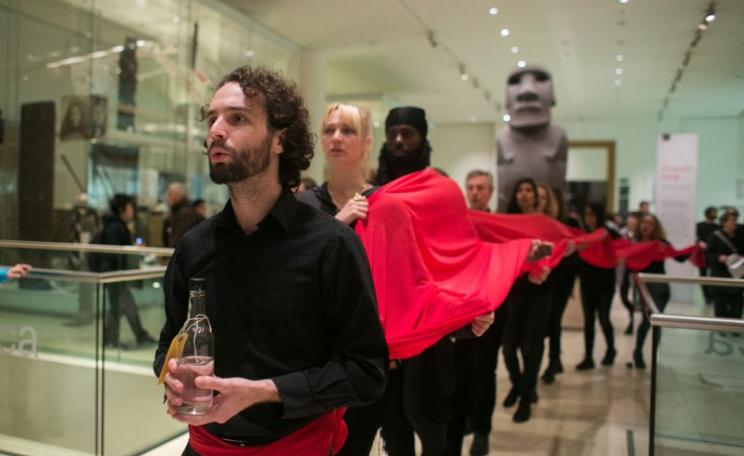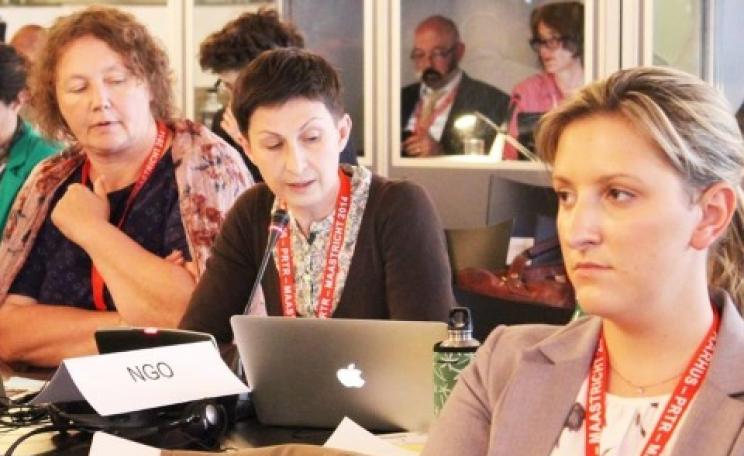Any time we see arts organisations take on BP as a sponsor, we want to make sure those institutions understand that they are sponsoring death. They are sponsoring death in our communities.
On Monday, almost a hundred cultural figures, politicians and academics published a letter calling on the new director of the British Museum to end its sponsorship deal with BP.
They argued that to receive sponsorship from BP is to condone its business plan - one that is incompatible with a stable climate.
Since then, cynics have tried to discredit the signatories - but yesterday they were stopped in their tracks.
After a 34-year partnership with BP, Edinburgh International Festival (EIF) launched its new programme - but this time without BP's cash.
BP blamed the end of the deal on a "challenging business environment" - oddly enough, exactly the same excuse it gave just weeks ago when the end of its sponsorship deal with Tate was announced.
It's clearly not true. The amount of money the company provides to Tate - and to the British Museum - represents just a couple of hours' worth of the £2 billion profit they made last year. In reality, public pressure and protest had become too great for these deals to continue.
The truth - 'big oil' provides small potatoes
Writing in the Telegraph on Monday, Tom Harris claimed to be concerned about the "shed-loads of cash" the British Museum would lose if it decided to drop BP. I'm also concerned about cuts to arts funding but BP's so-called 'donations' make up just 0.8% of the British Museum's budget. And with the EIF launching a blockbuster programme without BP sponsorship, it's clear that these institutions are far from reliant on oil money.
But what would happen if the British Museum did take a stand? Cutting out BP would not put the museum's core work at risk, and it's likely that the majority of staff would welcome such a move.
A survey by the PCS union last month found that 66% of British Museum workers are supportive of the anti-BP protests. And in a poll commissioned by the campaign group Platform, 49.6% of Londoners agreed that the British Museum should drop BP as a sponsor.
Tom Harris rightly points out that "expecting the public to dig even deeper at this time of austerity is a non-starter." So maybe he should consider the vast amounts taxpayers are currently giving to fossil fuel companies, including BP, in the form of misguided tax breaks and subsidies that run into billions of pounds.
Any time we see arts organisations take on BP as a sponsor, we want to make sure those institutions understand that they are sponsoring death. They are sponsoring death in our communities.
Redirecting a tiny fraction of this to the arts would provide far more money than BP's current contribution. It could also be shared around theatres, museums and galleries across the UK in desperate need of the cash (and in which BP has no interest at all).
Right wing media condoning corporate criminality
Writing in The Times, Stephen Pollard scoffed at the idea that "BP is beyond the pale as it produces not arms or cigarettes, but oil." But like with cigarettes, we know the risks of not quitting. For BP to continue extracting new sources of oil - when we must leave around 80% of known fossil fuel reserves in the ground in order to avoid catastrophic climate change - marks it out as a company on the wrong side of history.
And did he miss the announcement this week of BP's historic $20 billion settlement over its Gulf of Mexico spill? Or the record-breaking fines that made BP the world's biggest corporate criminal?
In an attempt to sound more balanced, Michael Skapinker argued in the FT that refusing oil sponsorship would not advance the fight against climate change. But he's wrong. BP has been relentlessly lobbying against crucial climate change legislation for decades - it knows that its profits depend on keeping society hooked on fossil fuels.
And BP's ability to influence policy-makers is only possible with the crucial social legitimacy that comes from, amongst other things, sponsoring respected cultural institutions.
It is vital to delegitimise the fossil fuel industry, by divesting and denying it the PR-benefits of sponsorship, in order to reduce its power over policy-makers. With that obstacle to progress removed, we might actually have a chance of tackling dangerous climate change.
'They are sponsoring death in our communities'
The irony for the British Museum though is that while it preserves the past, BP is putting the future at risk, and not just through its contribution to climate change. Many communities have had their rights trampled by BP, from Indigenous communities opposing the Canadian tar sands extraction to its partnerships with repressive regimes, such as in West Papua, Egypt and Azerbaijan.
BP's values are fundamentally at odds with those claimed by the British Museum and if the museum does decide to renew its BP sponsorship this year, it will have firmly placed BP's tainted money above the public's trust in it.
We believe the people we should really listen to are those living with the realities of BP's operations. US Gulf Coast residents contributed some genuine crude oil from the Deepwater Horizon spill to A History of BP in 10 Objects, our recent unsanctioned exhibition in the British Museum's Great Court.
Cherri Foytlin, from that community, puts it starkly: "Since 2010, there are a lot more graves in the Gulf of Mexico than there were before, and that's just the truth. So any time we see arts organisations take on BP as a sponsor, we want to make sure those institutions understand that they are sponsoring death.
"They are sponsoring death in our communities."
Chris Garrard is a composer and member of the campaign group, BP or not BP? which is part of the Art Not Oil coalition.







